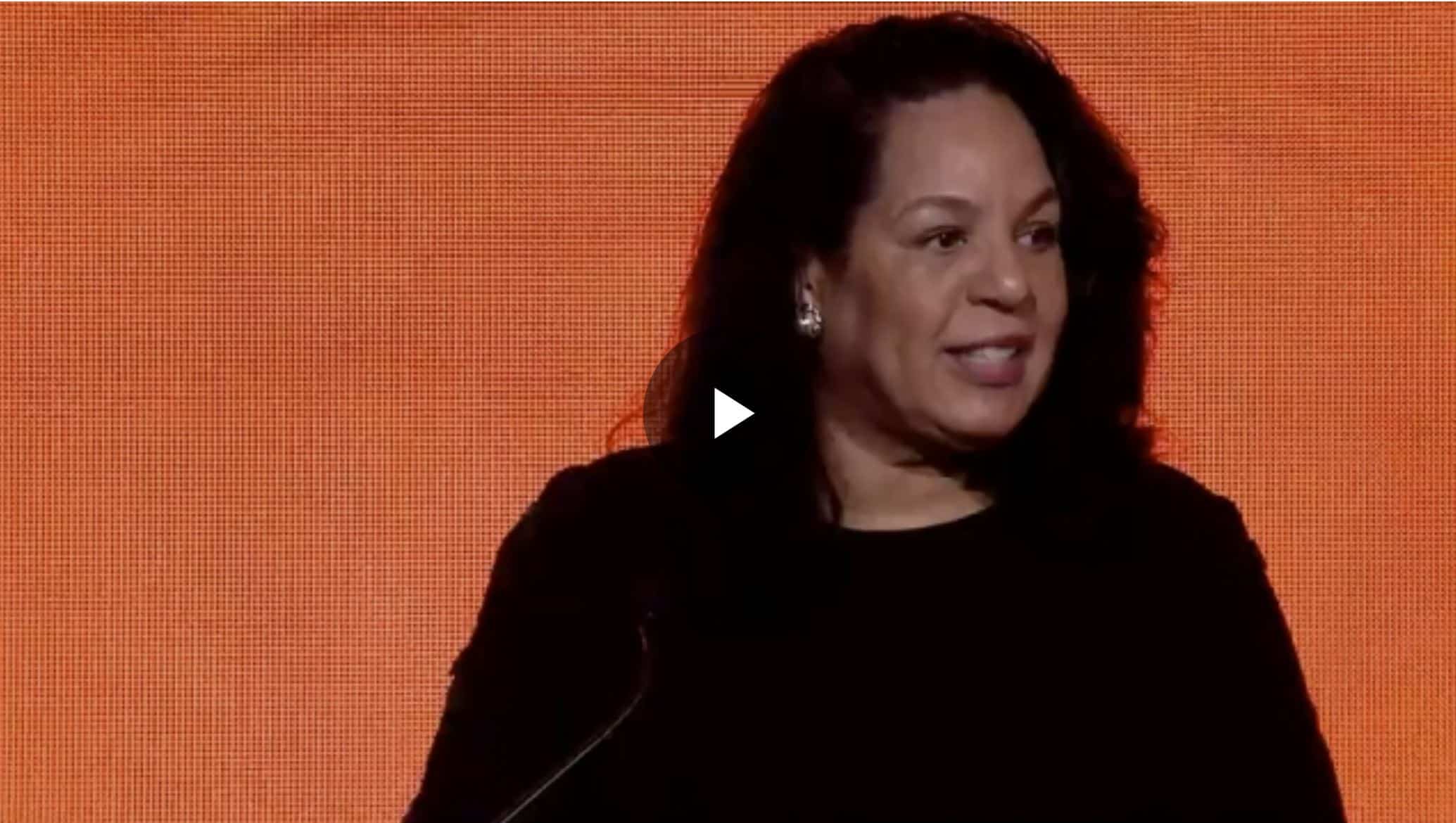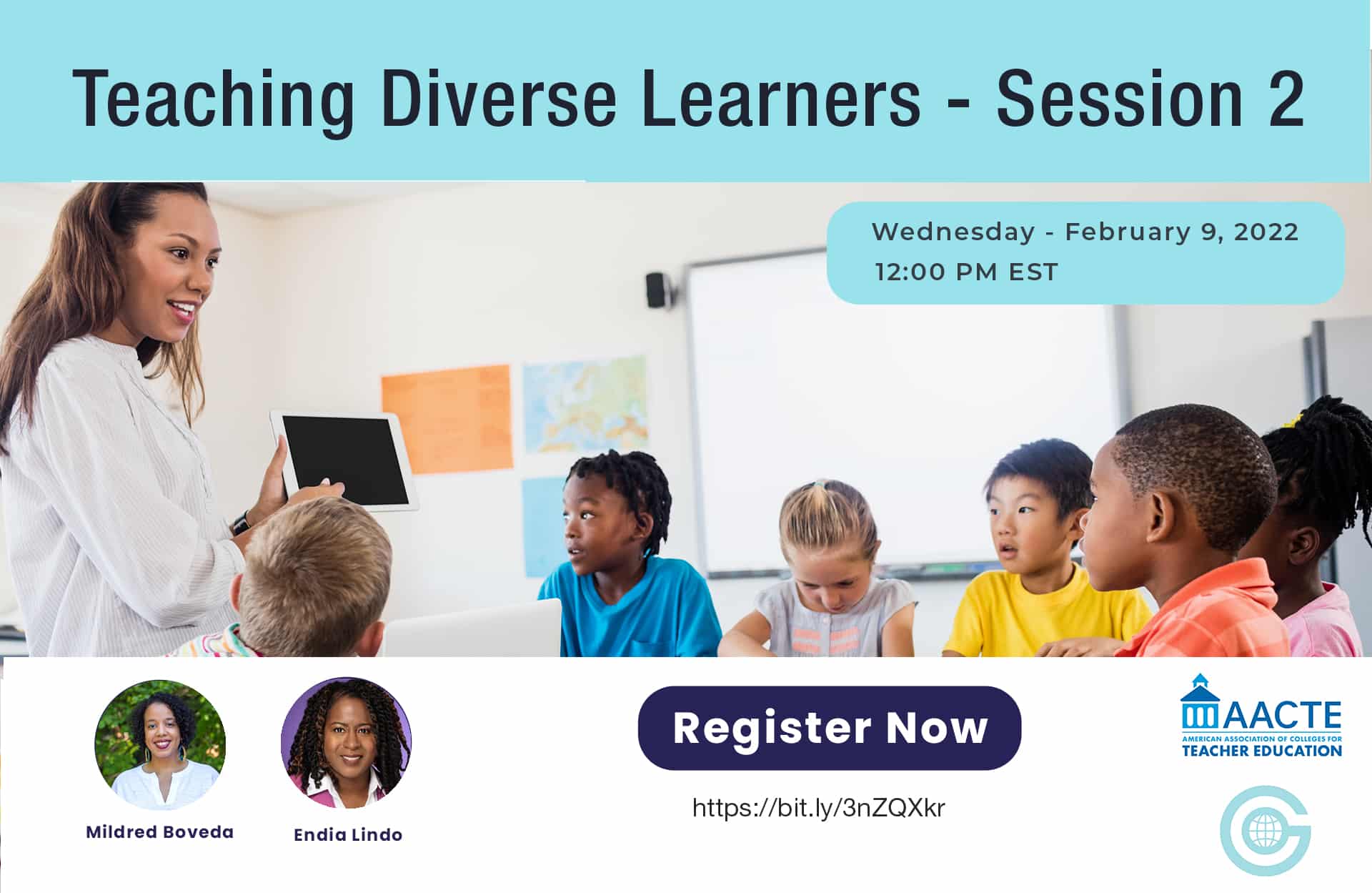19 Apr2022
By Margaret Gerry
 The AACTE 74th Annual Meeting culminated with a closing session keynote address by nationally renowned educator, education policy scholar, and best-selling author, Leslie T. Fenwick, Ph.D. Throughout her career, Fenwick has made significant contributions to the field of education, serving as the dean of Howard School of Education, and currently as AACTE’s dean in residence. In the closing keynote session, Fenwick shared insight and key themes from her book, Jim Crow’s Pink Slip: The Untold Story of Black Principal and Teacher Leadership, and she concluded with a series of recommendations to diversify the nation’s educator workforce and redefine school reform.
The AACTE 74th Annual Meeting culminated with a closing session keynote address by nationally renowned educator, education policy scholar, and best-selling author, Leslie T. Fenwick, Ph.D. Throughout her career, Fenwick has made significant contributions to the field of education, serving as the dean of Howard School of Education, and currently as AACTE’s dean in residence. In the closing keynote session, Fenwick shared insight and key themes from her book, Jim Crow’s Pink Slip: The Untold Story of Black Principal and Teacher Leadership, and she concluded with a series of recommendations to diversify the nation’s educator workforce and redefine school reform.
25 Jan2022
By Margaret Gerry
 The current demographics in the United States public school workforce are not representative of all students in American classroom settings. Though American classroom settings continue to grow in diversity, the teaching workforce remains predominantly white, middle class, and female. These racial inequalities in classroom settings may lead to biases, stereotype threats, and a need for more inclusive environments, thereby impacting student experiences in school settings in areas such as grades, disciplinary referrals, and teacher expectations of students. Across the field of education, stakeholders, including AACTE, are attempting to diversify the field in an attempt to improve the ability of our current teaching workforce to support their students who have different experiences from their own. In an era where, in the United States, our classrooms have never been more diverse with students from multiple cultures, socio-economic levels, and students with disabilities, how can we best prepare teachers to support all students in classroom settings?
The current demographics in the United States public school workforce are not representative of all students in American classroom settings. Though American classroom settings continue to grow in diversity, the teaching workforce remains predominantly white, middle class, and female. These racial inequalities in classroom settings may lead to biases, stereotype threats, and a need for more inclusive environments, thereby impacting student experiences in school settings in areas such as grades, disciplinary referrals, and teacher expectations of students. Across the field of education, stakeholders, including AACTE, are attempting to diversify the field in an attempt to improve the ability of our current teaching workforce to support their students who have different experiences from their own. In an era where, in the United States, our classrooms have never been more diverse with students from multiple cultures, socio-economic levels, and students with disabilities, how can we best prepare teachers to support all students in classroom settings?
18 Jan2022
By Margaret Gerry
 The current and historical public-school workforce in the United States remains predominantly white, middle class, and female; however, these demographics have never accurately represented all students in American classroom settings, which continue to grow in diversity. Classrooms are a place where the presence of biases, stereotype threats, and need for more inclusive environments resulting from differences between the demographics and lived experiences of the teaching workforce and students exist. While AACTE and other education stakeholders are taking up efforts to diversify the field, it is essential to improve the ability of our current educator workforce. In the United States, our classrooms have never been more diverse with students from multiple cultures, socio-economic levels, and disabilities. Thus, the essential question remains: How can we best prepare teachers to support all students in our classroom settings?
The current and historical public-school workforce in the United States remains predominantly white, middle class, and female; however, these demographics have never accurately represented all students in American classroom settings, which continue to grow in diversity. Classrooms are a place where the presence of biases, stereotype threats, and need for more inclusive environments resulting from differences between the demographics and lived experiences of the teaching workforce and students exist. While AACTE and other education stakeholders are taking up efforts to diversify the field, it is essential to improve the ability of our current educator workforce. In the United States, our classrooms have never been more diverse with students from multiple cultures, socio-economic levels, and disabilities. Thus, the essential question remains: How can we best prepare teachers to support all students in our classroom settings?
 The AACTE 74th Annual Meeting culminated with a closing session keynote address by nationally renowned educator, education policy scholar, and best-selling author, Leslie T. Fenwick, Ph.D. Throughout her career, Fenwick has made significant contributions to the field of education, serving as the dean of Howard School of Education, and currently as AACTE’s dean in residence. In the closing keynote session, Fenwick shared insight and key themes from her book, Jim Crow’s Pink Slip: The Untold Story of Black Principal and Teacher Leadership, and she concluded with a series of recommendations to diversify the nation’s educator workforce and redefine school reform.
The AACTE 74th Annual Meeting culminated with a closing session keynote address by nationally renowned educator, education policy scholar, and best-selling author, Leslie T. Fenwick, Ph.D. Throughout her career, Fenwick has made significant contributions to the field of education, serving as the dean of Howard School of Education, and currently as AACTE’s dean in residence. In the closing keynote session, Fenwick shared insight and key themes from her book, Jim Crow’s Pink Slip: The Untold Story of Black Principal and Teacher Leadership, and she concluded with a series of recommendations to diversify the nation’s educator workforce and redefine school reform. 






 The current demographics in the United States public school workforce are not representative of all students in American classroom settings. Though American classroom settings continue to grow in diversity, the teaching workforce remains predominantly white, middle class, and female. These racial inequalities in classroom settings may lead to biases, stereotype threats, and a need for more inclusive environments, thereby impacting student experiences in school settings in areas such as grades, disciplinary referrals, and teacher expectations of students. Across the field of education, stakeholders, including AACTE, are attempting to diversify the field in an attempt to improve the ability of our current teaching workforce to support their students who have different experiences from their own. In an era where, in the United States, our classrooms have never been more diverse with students from multiple cultures, socio-economic levels, and students with disabilities, how can we best prepare teachers to support all students in classroom settings?
The current demographics in the United States public school workforce are not representative of all students in American classroom settings. Though American classroom settings continue to grow in diversity, the teaching workforce remains predominantly white, middle class, and female. These racial inequalities in classroom settings may lead to biases, stereotype threats, and a need for more inclusive environments, thereby impacting student experiences in school settings in areas such as grades, disciplinary referrals, and teacher expectations of students. Across the field of education, stakeholders, including AACTE, are attempting to diversify the field in an attempt to improve the ability of our current teaching workforce to support their students who have different experiences from their own. In an era where, in the United States, our classrooms have never been more diverse with students from multiple cultures, socio-economic levels, and students with disabilities, how can we best prepare teachers to support all students in classroom settings? The current and historical public-school workforce in the United States remains predominantly white, middle class, and female; however, these demographics have never accurately represented all students in American classroom settings, which continue to grow in diversity. Classrooms are a place where the presence of biases, stereotype threats, and need for more inclusive environments resulting from differences between the demographics and lived experiences of the teaching workforce and students exist. While AACTE and other education stakeholders are taking up efforts to diversify the field, it is essential to improve the ability of our current educator workforce. In the United States, our classrooms have never been more diverse with students from multiple cultures, socio-economic levels, and disabilities. Thus, the essential question remains: How can we best prepare teachers to support all students in our classroom settings?
The current and historical public-school workforce in the United States remains predominantly white, middle class, and female; however, these demographics have never accurately represented all students in American classroom settings, which continue to grow in diversity. Classrooms are a place where the presence of biases, stereotype threats, and need for more inclusive environments resulting from differences between the demographics and lived experiences of the teaching workforce and students exist. While AACTE and other education stakeholders are taking up efforts to diversify the field, it is essential to improve the ability of our current educator workforce. In the United States, our classrooms have never been more diverse with students from multiple cultures, socio-economic levels, and disabilities. Thus, the essential question remains: How can we best prepare teachers to support all students in our classroom settings?